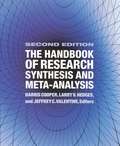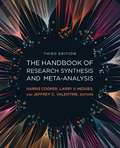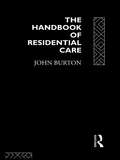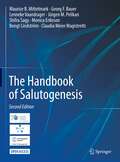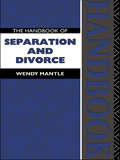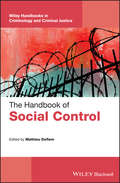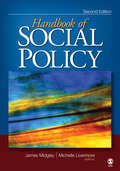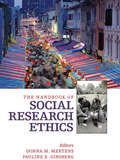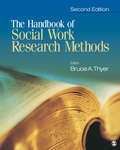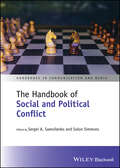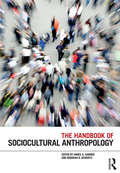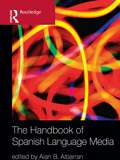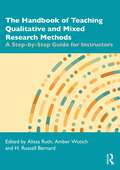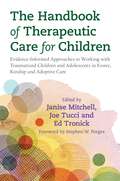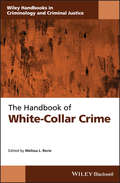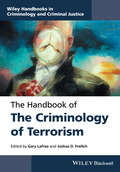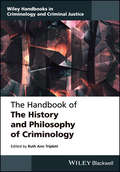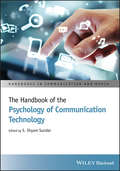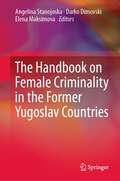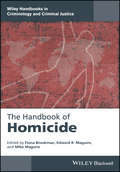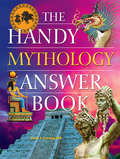- Table View
- List View
The Handbook of Research Synthesis and Meta-Analysis
by Larry V. Hedges Harris Cooper Jeffrey C. ValentinePraise for the first edition: “The Handbook is a comprehensive treatment of literature synthesis and provides practical advice for anyone deep in the throes of, just teetering on the brink of, or attempting to decipher a meta-analysis. Given the expanding application and importance of literature synthesis, understanding both its strengths and weaknesses is essential for its practitioners and consumers. This volume is a good beginning for those who wish to gain that understanding.” —Chance “Meta-analysis, as the statistical analysis of a large collection of results from individual studies is called, has now achieved a status of respectability in medicine. This respectability, when combined with the slight hint of mystique that sometimes surrounds meta-analysis, ensures that results of studies that use it are treated with the respect they deserve….The Handbook of Research Synthesis is one of the most important publications in this subject both as a definitive reference book and a practical manual.”—British Medical Journal When the first edition of The Handbook of Research Synthesis was published in 1994, it quickly became the definitive reference for researchers conducting meta-analyses of existing research in both the social and biological sciences. In this fully revised second edition, editors Harris Cooper, Larry Hedges, and Jeff Valentine present updated versions of the Handbook’s classic chapters, as well as entirely new sections reporting on the most recent, cutting-edge developments in the field. Research synthesis is the practice of systematically distilling and integrating data from a variety of sources in order to draw more reliable conclusions about a given question or topic. The Handbook of Research Synthesis and Meta-Analysis draws upon years of groundbreaking advances that have transformed research synthesis from a narrative craft into an important scientific process in its own right. Cooper, Hedges, and Valentine have assembled leading authorities in the field to guide the reader through every stage of the research synthesis process—problem formulation, literature search and evaluation, statistical integration, and report preparation. The Handbook of Research Synthesis and Meta-Analysis incorporates state-of-the-art techniques from all quantitative synthesis traditions. Distilling a vast technical literature and many informal sources, the Handbook provides a portfolio of the most effective solutions to the problems of quantitative data integration. Among the statistical issues addressed by the authors are the synthesis of non-independent data sets, fixed and random effects methods, the performance of sensitivity analyses and model assessments, and the problem of missing data. The Handbook of Research Synthesis and Meta-Analysis also provides a rich treatment of the non-statistical aspects of research synthesis. Topics include searching the literature, and developing schemes for gathering information from study reports. Those engaged in research synthesis will also find useful advice on how tables, graphs, and narration can be used to provide the most meaningful communication of the results of research synthesis. In addition, the editors address the potentials and limitations of research synthesis, and its future directions. The past decade has been a period of enormous growth in the field of research synthesis. The second edition Handbook thoroughly revises original chapters to assure that the volume remains the most authoritative source of information for researchers undertaking meta-analysis today. In response to the increasing use of research synthesis in the formation of public policy, the second edition includes a new chapter on both the strengths and limitations of research synthesis in policy debates
The Handbook of Research Synthesis and Meta-Analysis
by Larry V. Hedges Harris Cooper Jeffrey C. ValentineResearch synthesis is the practice of systematically distilling and integrating data from many studies in order to draw more reliable conclusions about a given research issue. When the first edition of The Handbook of Research Synthesis and Meta-Analysis was published in 1994, it quickly became the definitive reference for conducting meta-analyses in both the social and behavioral sciences. In the third edition, editors Harris Cooper, Larry Hedges, and Jeff Valentine present updated versions of classic chapters and add new sections that evaluate cutting-edge developments in the field. The Handbook of Research Synthesis and Meta-Analysis draws upon groundbreaking advances that have transformed research synthesis from a narrative craft into an important scientific process in its own right. The editors and leading scholars guide the reader through every stage of the research synthesis process—problem formulation, literature search and evaluation, statistical integration, and report preparation. The Handbook incorporates state-of-the-art techniques from all quantitative synthesis traditions and distills a vast literature to explain the most effective solutions to the problems of quantitative data integration. Among the statistical issues addressed are the synthesis of non-independent data sets, fixed and random effects methods, the performance of sensitivity analyses and model assessments, the development of machine-based abstract screening, the increased use of meta-regression and the problems of missing data. The Handbook also addresses the non-statistical aspects of research synthesis, including searching the literature and developing schemes for gathering information from study reports. Those engaged in research synthesis will find useful advice on how tables, graphs, and narration can foster communication of the results of research syntheses. The third edition of the Handbook provides comprehensive instruction in the skills necessary to conduct research syntheses and represents the premier text on research synthesis. Praise for the first edition: "The Handbook is a comprehensive treatment of literature synthesis and provides practical advice for anyone deep in the throes of, just teetering on the brink of, or attempting to decipher a meta-analysis. Given the expanding application and importance of literature synthesis, understanding both its strengths and weaknesses is essential for its practitioners and consumers. This volume is a good beginning for those who wish to gain that understanding." —Chance "Meta-analysis, as the statistical analysis of a large collection of results from individual studies is called, has now achieved a status of respectability in medicine. This respectability, when combined with the slight hint of mystique that sometimes surrounds meta-analysis, ensures that results of studies that use it are treated with the respect they deserve….The Handbook of Research Synthesis is one of the most important publications in this subject both as a definitive reference book and a practical manual."—British Medical Journal When the first edition of The Handbook of Research Synthesis was published in 1994, it quickly became the definitive reference for researchers conducting meta-analyses of existing research in both the social and biological sciences. In this fully revised second edition, editors Harris Cooper, Larry Hedges, and Jeff Valentine present updated versions of the Handbook's classic chapters, as well as entirely new sections reporting on the most recent, cutting-edge developments in the field. Research synthesis is the practice of systematically distilling and integrating data from a variety of sources in order to draw more reliable conclusions about a given question or topic. The Handbook of Research Synthesis and Meta-Analysis draws upon years of groundbreaking advances that have transformed research synthesis from a narrative craft into an important scientific process in its own right. Cooper, Hedges, and Valentine have assembled leading authorities in the field to guide the reader through
The Handbook of Residential Care
by John BurtonDesigned as a practical guide, The Handbook of Residential Care presents a unique combination of real examples and case studies, analysis, guidance and reflective discussion. It brings together all areas of residential work and all levels of involvement in it, with an emphasis of direct personal work and everyday experiences. With checklists and action plans, the Handbook will promote effectiveness among residential workers - through self-management, building relationships, creating helpful organisation, and resisting bureaucratic and impersonal organisation. Invaluable to all practitioners, team leaders and managers in residential care, the Handbook provides a wealth of new ideas and many challenges to established policy and practice.
The Handbook of Salutogenesis
by Georg F. Bauer Maurice B. Mittelmark Shifra Sagy Monica Eriksson Jürgen M. Pelikan Bengt Lindström Lenneke Vaandrager Claudia Meier MagistrettiThis open access book is a thorough update and expansion of the 2017 edition of The Handbook of Salutogenesis, responding to the rapidly growing salutogenesis research and application arena.Revised and updated from the first edition are background and historical chapters that trace the development of the salutogenic model of health and flesh out the central concepts, most notably generalized resistance resources and the sense of coherence that differentiate salutogenesis from pathogenesis. From there, experts describe a range of real-world applications within and outside health contexts. Many new chapters emphasize intervention research findings. Readers will find numerous practical examples of how to implement salutogenesis to enhance the health and well-being of families, infants and young children, adolescents, unemployed young people, pre-retirement adults, and older people. A dedicated section addresses how salutogenesis helps tackle vulnerability, with chapters on at-risk children, migrants, prisoners, emergency workers, and disaster-stricken communities. Wide-ranging coverage includes new topics beyond health, like intergroup conflict, politics and policy-making, and architecture. The book also focuses on applying salutogenesis in birth and neonatal care clinics, hospitals and primary care, schools and universities, workplaces, and towns and cities. A special section focuses on developments in salutogenesis methods and theory.With its comprehensive coverage, The Handbook of Salutogenesis, 2nd Edition, is the standard reference for researchers, practitioners, and health policy-makers who wish to have a thorough grounding in the topic. It is also written to support post-graduate education courses and self-study in public health, nursing, psychology, medicine, and social sciences.
The Handbook of Security
by Martin GillThe substantially revised third edition of The Handbook of Security provides the most comprehensive analysis of scholarly security debates and issues to date. It reflects the developments in security technology, the convergence of the cyber and security worlds, and the fact that security management has become even more business focused. It covers newer topics like terrorism, violence, and cybercrime through various offence types such as commercial robbery and bribery. This handbook comprises mostly brand new chapters and a few thoroughly revised chapters, with discussions of the impact of the pandemic. It includes contributions from some of the world's leading scholars from an even broader geographic scale to critique the way security is provided and managed. It speaks to professionals working in security and students studying security-related courses.
The Handbook of Separation and Divorce
by Wendy MantleThere are few people whose lives are unaffected by marriage breakdown. Yet how many are well informed about the divorce process and/or appreciate the wide powers the court has to redistribute property and income after divorce? Those who act without the benefit of specialist legal advice can risk impoverishing themselves and their families by accepting less than the court may award them or offering more than the court would order them to give. The Handbook of Separation and Divorce is principally concerned with the financial consequences of marriage breakdown in England and Wales. It suggests what should be done when a marriage is in difficulty and ensures that advice is obtained from a solicitor who is a specialist. It recognises that everyone who separates or divorces will be the poorer and recommends that where appropriate those who can face mediation should undertake it while at the same time ensuring they can get independent legal advice. The Handbook of Separation and Divorce will be essential reading for social workers and health professionals as well as the general reader and those going through, or considering, divorce or separation.
The Handbook of Social Control (Wiley Handbooks in Criminology and Criminal Justice)
by Mathieu DeflemAn essential resource that contains a contemporary overview of the concept of social control and its main approaches The Handbook of Social Control offers a comprehensive review of the concepts of social control in today’s environment and focuses on the most relevant theories associated with social control. With contributions from noted experts in the field across 32 chapters, the depth and scope of the Handbook reflects the theoretical and methodological diversity that exists within the study of social control. Chapters explore various topics including: theoretical perspectives; institutions and organizations; law enforcement; criminal justice agencies; punishment and incarceration; surveillance; and global developments. This Handbook explores a variety of issues and themes on social control as being a central theme of criminological reflection. The text clearly demonstrates the rich heritage of the major relevant perspectives of social control and provides an overview of the most important theories and dimensions of social control today. Clarifies the most salient theoretical and conceptual issues involved with the social-scientific study of social control Considers the various societal organizations and agencies that are involved with the planning and execution of social control mechanisms Includes information on the history of incarceration, the dynamics of prison culture, the problem of mass incarceration, the resistance of abolitionism, and the death penalty Discusses the dynamics of border control and immigration policies Written for academics, undergraduate, and graduate students in the fields of criminology, criminal justice, and sociology, The Handbook of Social Control is an indispensable resource that explores a contemporary view of the concept of social control.
The Handbook of Social Policy
by James Midgley and Michelle LivermoreSocial policy is a continuously evolving field requiring constant review, documentation, and analysis. The Handbook of Social Policy is an attempt to document the now substantial body of knowledge about government social policies that has been accumulated since the study of social policy first emerged as an organized field of academic endeavor about 50 years ago. The Second Edition offers a more streamlined format to make the book more consistent with the way most instructors teach their courses. This text is a comprehensive yet accessible introduction to a vast field of endeavor that has, over the years, made a significant difference to the lives and the well-being of the people of the United States. New to the Second Edition Provides up-to-date policies and references to include the latest information on social policy Offers a state of the art account of American social policy at the beginning of the 21st century Presents contributions, including more case studies and examples, from leading experts in their respective areas challenge the norm in thinking about social welfare policy Focuses more attention on diverse populations and international issues Includes added content to reflect the areas that have received increased attention such as advocacy, policy practice, immigration issues, discrimination, and more Intended Audience This is excellent text for advanced undergraduate and graduate courses such as History of Social Policy, Education and Social Policy, and International Social Policy in the fields of social policy, public policy and administration, and social work.
The Handbook of Social Research Ethics
by Donna M. Mertens Dr Pauline E. GinsbergThe Handbook of Social Research Ethics is the first comprehensive volume of its kind to offer a deeper understanding of the history, theory, philosophy, and implementation of applied social research ethics. Editors Donna M. Mertens and Pauline Ginsberg bring together eminent, international scholars across the social and behavioral sciences and education to address the ethical issues that arise in the theory and practice of research within the technologically advancing and culturally complex world in which we live. In addition, this volume examines the ethical dilemmas that arise in the relationship between research practice and social justice issues. Key Features Situates the ethical concerns in the practice of social science research in historical and epistemological contexts Explores the philosophical roots of ethics from the perspectives of Kant, J.S. Mill, Hegel, and others Provides an overview and comparison of ethical regulations across disciplines, governments, and additional contexts such as IRBs, program evaluation, and more Examines specific ethical issues that arise in traditional methods and methodologies Addresses ethical concerns within a variety of diverse, cultural contexts Intended Audience This reference is an invaluable resource for university faculty, researchers, ethicists, IRB members, social science practitioners, graduate students, and program evaluators throughout the social and behavioral sciences.
The Handbook of Social Work Research Methods
by Bruce A. ThyerClick on the Supplements tab above for further details on the different versions of SPSS programs.The canonical Handbook is completely updated with more student-friendly features The Handbook of Social Work Research Methods is a cutting-edge volume that covers all the major topics that are relevant for Social Work Research methods. Edited by Bruce Thyer and containing contributions by leading authorities, this Handbook covers both qualitative and quantitative approaches as well as a section that delves into more general issues such as evidence based practice, ethics, gender, ethnicity, International Issues, integrating both approaches, and applying for grants. New to this EditionMore content on qualitative methods and mixed methods More coverage of evidence-based practice More support to help students effectively use the Internet A companion Website containing a test bank and PowerPoint slides for instructors and relevant SAGE journal articles for students. This Handbook serves as a primary text in the methods courses in MSW programs and doctoral level programs. It can also be used as a reference and research design tool for anyone doing scholarly research in social work or human services.
The Handbook of Social and Political Conflict (Handbooks in Communication and Media)
by Solon Simmons Sergei A. SamoilenkoProvides real-world insights into social and political conflict across disciplines The Handbook of Social and Political Conflict offers a comprehensive exploration of conflict from a variety of disciplinary perspectives, merging insights from fields including sociology, political science, psychology, communication, and conflict resolution. Bringing together original work by experts from around the world, this authoritative volume provides readers with a deep understanding of the mechanisms, causes, and consequences of conflict. Designed for those who wish to bridge academic disciplines, the Handbook both advances theoretical understanding and offers practical conflict resolution strategies that can be applied in a broad range of contexts, from interpersonal disputes to international tensions. Each in-depth chapter tackles a unique concept while maintaining a coherent narrative that spans topics such as political polarization, the rhetoric of social control, the role of technology in shaping conflict behaviors, and much more. Presenting new theoretical perspectives and tools to address today's most pressing issues, the Handbook of Social and Political Conflict: Examines contemporary issues such as political polarization, social ostracism, cancel culture, and information warfare Contains in-depth analysis of critical contemporary issues such as the role of technology, artificial intelligence, and media in modern conflict Addresses both adversarial and cooperative approaches to conflict resolution Incorporates cutting-edge research and theoretical frameworks on contemporary social and political conflicts Offers practical approaches to fostering resilience, peacebuilding, and critical media literacy Whether examining the escalation of political tensions or exploring the potential for peacebuilding, the Handbook of Social and Political Conflict is ideal for graduate and advanced undergraduate students in conflict resolution, political science, sociology, and communication studies. It is also an invaluable reference for professionals working in conflict management, diplomacy, international relations, and social advocacy.
The Handbook of Sociocultural Anthropology
by James G. Carrierhe Handbook of Sociocultural Anthropology presents a state of the art overview of the subject - its methodologies, current debates, history and future. It will provide the ultimate source of authoritative, critical descriptions of all the key aspects of the discipline as well as a consideration of the general state of the discipline at a time when there is notable uncertainty about its foundations, composition and direction. Divided into five core sections, the Handbook: examines the changing theoretical and analytical orientations that have led to new ways of carrying out research; presents an analysis of the traditional historical core and how the discipline has changed since 1980; considers the ethnographic regions where work has had the greatest impact on anthropology as a whole; outlines the people and institutions that are the context in which the discipline operates, covering topics from research funding to professional ethics.Bringing together leading international scholars, the Handbook provides a guide to the latest research in social and cultural anthropology. Presenting a systematic overview - and offering a wide range of examples, insights and analysis - it will be an invaluable resource for researchers and students in anthropology as well as cultural and social geography, cultural studies and sociology.
The Handbook of Spanish Language Media
by Alan AlbarranWith the rise of Spanish language media around the world, The Handbook of Spanish Language Media provides an overview of the field and its emerging issues. This Handbook will serve as the definitive source for scholars interested in this emerging field of study; not only to provide background knowledge of the various issues and topics relevant to Spanish language media, but also to establish directions for future research in this rapidly growing area. This volume draws on the expertise of authors and collaborators across the globe. The book is an essential reference work for graduate students, scholars, and media practitioners interested in Spanish language media, and is certain to influence the course of future research in this growing and increasingly influential area.
The Handbook of Teaching Qualitative and Mixed Research Methods: A Step-by-Step Guide for Instructors
by H. Russell Bernard Amber Wutich Alissa RuthThe Handbook of Teaching Qualitative and Mixed Research Methods: A Step-by-Step Guide for Instructors presents diverse pedagogical approaches to teaching 71 qualitative and mixed methods. These tried-and-true methods are widely applicable to those teaching and those being trained in qualitative and mixed-methods research. The methods for data collection cover ethics, sampling, interviewing, recording observations of behavior, Indigenous and decolonizing methods and methodologies as well as visual and participatory methods. Methods for analyzing data include coding and finding themes, exploratory and inductive analysis, linguistic analysis, mixed-methods analysis, and comparative analysis. Each method has its own 1,500-word lesson (i.e., chapter) written by expert methodologists from around the globe. In these lessons, contributors give the reader a brief history of the method and describe how they teach it by including their best practices—with succinct, step-by-step instructions—focusing on student-centered experiential and active learning exercises. This comprehensive, one-of a-kind text is an essential reference for instructors who teach qualitative and/or mixed methods across the Social and Behavioral Sciences and other related disciplines, including Anthropology, Sociology, Education, and Health/Nursing research.
The Handbook of Therapeutic Care for Children: Evidence-Informed Approaches to Working with Traumatized Children and Adolescents in Foster, Kinship and Adoptive Care
by Bruce D. Perry Daniel Hughes Allan N. Schore Jonathan Baylin Elaine Farmer Kim Golding Cathy A Malchiodi Noel Macnamara Meredith Kiraly Kathomi Gatwiri Martin H. Teicher Orgilmaa Munkbaatar Glenda Kickett Shaun ChandranThis innovative book brings together a wide range of therapeutic approaches, techniques and models to outline recent developments in the practice of supporting children in out-of-home care. It sheds light on the significance of schools, sports and peer relationships in the lives of traumatized children. It also draws particular attention to the vital importance of taking into account children's cultural heritage, and to the growing prevalence of relative care.Each chapter is set out by acclaimed and world-renowned contributors' specific approach, such as Dan Hughes and his work on conceptual maps and Cathy Malchiodi and her research on creative interventions, and gives practical ways to support children and carers. It also includes contributions from Bruce Perry, Allan Schore and Martin Teicher. This comprehensive volume will open new avenues for understanding how the relationship between child and carer can create opportunities for change and healing.
The Handbook of White-Collar Crime (Wiley Handbooks in Criminology and Criminal Justice)
by Melissa L. RorieA comprehensive and state-of the-art overview from internationally-recognized experts on white-collar crime covering a broad range of topics from many perspectives Law enforcement professionals and criminal justice scholars have debated the most appropriate definition of “white-collar crime” ever since Edwin Sutherland first coined the phrase in his speech to the American Sociological Society in 1939. The conceptual ambiguity surrounding the term has challenged efforts to construct a body of science that meaningfully informs policy and theory. The Handbook of White-Collar Crime is a unique re-framing of traditional discussions that discusses common topics of white-collar crime—who the offenders are, who the victims are, how these crimes are punished, theoretical explanations—while exploring how the choice of one definition over another affects research and scholarship on the subject. Providing a one-volume overview of research on white-collar crime, this book presents diverse perspectives from an international team of both established and newer scholars that review theory, policy, and empirical work on a broad range of topics. Chapters explore the extent and cost of white-collar crimes, individual- as well as organizational- and macro-level theories of crime, law enforcement roles in prevention and intervention, crimes in Africa and South America, the influence of technology and globalization, and more. This important resource: Explores diverse implications for future theory, policy, and research on current and emerging issues in the field Clarifies distinct characteristics of specific types of offences within the general archetype of white-collar crime Includes chapters written by researchers from countries commonly underrepresented in the field Examines the real-world impact of ambiguous definitions of white-collar crime on prevention, investigation, and punishment Offers critical examination of how definitional decisions steer the direction of criminological scholarship Accessible to readers at the undergraduate level, yet equally relevant for experienced practitioners, academics, and researchers, The Handbook of White-Collar Crime is an innovative, substantial contribution to contemporary scholarship in the field.
The Handbook of the Criminology of Terrorism (Wiley Handbooks in Criminology and Criminal Justice)
by Gary LaFree Joshua D. FreilichThe Handbook of the Criminology of Terrorism features a collection of essays that represent the most recent criminological research relating to the origins and evolution of, along with responses to, terrorism, from a criminological perspective. Offers an authoritative overview of the latest criminological research into the causes of and responses to terrorism in today’s world Covers broad themes that include terrorism’s origins, theories, methodologies, types, relationship to other forms of crime, terrorism and the criminal justice system, ways to counter terrorism, and more Features original contributions from a group of international experts in the field Provides unique insights into the field through an exclusive focus on criminological conceptual frameworks and empirical studies that engage terrorism and responses to it
The Handbook of the History and Philosophy of Criminology (Wiley Handbooks in Criminology and Criminal Justice)
by Ruth Ann TriplettFeaturing contributions by distinguished scholars from ten countries, The Wiley Handbook of the History and Philosophy of Criminology provides students, scholars, and criminologists with a truly a global perspective on the theory and practice of criminology throughout the centuries and around the world. In addition to chapters devoted to the key ideas, thinkers, and moments in the intellectual and philosophical history of criminology, it features in-depth coverage of the organizational structure of criminology as an academic discipline world-wide. The first section focuses on key ideas that have shaped the field in the past, are shaping it in the present, and are likely to influence its evolution in the foreseeable future. Beginning with early precursors to criminology’s emergence as a unique discipline, the authors trace the evolution of the field, from the pioneering work of 17th century Italian jurist/philosopher, Cesare Beccaria, up through the latest sociological and biosocial trends. In the second section authors address the structure of criminology as an academic discipline in countries around the globe, including in North America, South America, Europe, East Asia, and Australia. With contributions by leading thinkers whose work has been instrumental in the development of criminology and emerging voices on the cutting edge The Wiley Handbook of the History and Philosophy of Criminology provides valuable insights in the latest research trends in the field world-wide - the ideal reference for criminologists as well as those studying in the field and related social science and humanities disciplines.
The Handbook of the Psychology of Communication Technology (Handbooks in Communication and Media #32)
by S. Shyam SundarThe Handbook of the Psychology of Communication Technology offers an unparalleled source for seminal and cutting-edge research on the psychological aspects of communicating with and via emergent media technologies, with leading scholars providing insights that advance our knowledge on human-technology interactions. • A uniquely focused review of extensive research on technology and digital media from a psychological perspective• Authoritative chapters by leading scholars studying psychological aspects of communication technologies• Covers all forms of media from Smartphones to Robotics, from Social Media to Virtual Reality• Explores the psychology behind our use and abuse of modern communication technologies• New theories and empirical findings about ways in which our lives are transformed by digital media
The Handbook on Female Criminality in the Former Yugoslav Countries
by Elena Maksimova Angelina Stanojoska Darko DimovskiThis edited volume is the first volume that researches female criminality in the Balkan region and provides insights about patriarchal relations, gender roles, and female criminal behavior. The chapters provide research and data about crimes committed by females in Serbia, North Macedonia, Montenegro, Bosnia and Hercegovina, Croatia, and Slovenia. The chapters investigate topics such as: Long violence Social abuse and discrimination Life trajectories towards criminal behavior Women facing financial stress and dependence and how it relates to crime Women in the criminal justice system Examining the relationship between crime, gender, and the “modernization” of Balkan (ex-Yugoslavian) social structure, this volume is ideal for interdisciplinary criminology scholars specializing in the Balkans. Chapter 3 is available open access under a Creative Commons Attribution 4.0 International License via link.springer.com
The Handbook of Homicide (Wiley Handbooks in Criminology and Criminal Justice)
by Fiona Brookman Mike Maguire Edward R. MaguireThe Handbook of Homicide presents a series of original essays by renowned authors from around the world, reflecting the latest scholarship on the nature, causes, and patterns of homicide, as well as policies and practices for its investigation and prevention. Includes comprehensive coverage of the complex phenomenon of homicide and its various forms Features original contributions from an esteemed team of global experts and scholars with chapters highlighting the authors’ original research Represents the first internationally-focused collection of the latest research on the nature and causes of homicide Covers both the causes and dynamics of homicide, as well as policies and practices intended to address it
The Handicapped in Literature: A Psychosocial Perspective
by Eli M. BowerThe way to understand the nature of the special education task is to know the children and youth. One excellent way to know them is to experience their lives, drawn taut by the sensitivity and insight of the literary masters. That is the "why" of this book. It does not stop with information; it arouses and activates empathic feelings for handicapped.
The Hands of Strangers
by Janice N. HarringtonAs people live longer, we face the challenges that come with caring for, and living as, an aging population. This collection focuses on the sad, funny, mundane reality of life in a nursing home. In her own words, Janice N. Harrington worked her way through college as a nurses' aide and wrote The Hands of Strangers because she "cannot forget the 'girls' I worked with or the 'residents' under my care. I haven't forgotten what I saw, heard, felt, or learned." Janic N. Harrington's debut Even the Hollow My Body Made is Gone earned teh 2007 Kate Tufts Discovery Award, the A. Poulin Jr. Poetry Prize, and an NEA fellowship for poetry.
The Hands of Strangers: Poems from the Nursing Home (American Poets Continuum)
by Janice N. HarringtonAs people live longer, we face the challenges that come with caring for, and living as, an aging population. This collection focuses on the sad, funny, mundane reality of life in a nursing home. In her own words, Janice N. Harrington worked her way through college as a nurses' aide and wrote The Hands of Strangers because she "cannot forget the 'girls' I worked with or the 'residents' under my care. I haven't forgotten what I saw, heard, felt, or learned." Janic N. Harrington's debut Even the Hollow My Body Made is Gone earned teh 2007 Kate Tufts Discovery Award, the A. Poulin Jr. Poetry Prize, and an NEA fellowship for poetry.
The Handy Mythology Answer Book
by David A. LeemingStories centuries in the making, and many centuries worth of stories, are an integral part of modern society. Whether modern or ancient, every culture has its myths. Mythology forms our understanding of our origin, history, and traditions. They tell of our heroes and deities. Myths are vehicles for understanding religion, for learning language, and for understanding society, but they can often be difficult to understand and confusing. The Handy Mythology Answer Book examines and explains, in plain English, numerous myths and mythology.From the ancient Greek and Roman to Egypt and Babylon, from Native North American Indian to Celtic, Middle Eastern, Indian, Asian, African, and the lesser known myths from around the world, The Handy Mythology Answer Book has them covered. Whether it is the modern retelling of a classic myth or an ancient story about a Norse god, this helpful resource demystifies the myth, looks at different archetypes and motifs, and even shows how myths help explain our existence and institutions. It answers nearly 600 questions and offers fun facts about the treachery and violence, the inspirational and epic, the supernatural monsters and heroic mortals found in mythology, such asHow and when did myths originate?What are the three primary myth types?What is the nature of Creation Myths?How can myths be compared to dreams?Why do humans tell myths?What was the Egyptian Book of the Dead?How is the epic of Gilgamesh like later epics?Why is the biblical flood story so like the Babylonian flood myth?What was the myth of Theseus, the Labyrinth, and the Minotaur?What are the Homeric Hymns?How and why are the Odyssey and the Iliad so different from each other?What is the popular appeal of the Odyssey?Did the Greeks see these myths as religion or as entertainment?What was the background myth of the Oedipus plays?What was the nature of Roman mythology during the Roman Republic?What was the Metamorphosis?How did Christian narrative and tradition fit into and come to dominate the Roman mythological tradition?How is Celtic culture and mythology related to the culture and mythology of Greek, Roman, and other cultures?How did the Vedas contribute to Hindu mythology?Who invented Chinese writing?What was the Aztec pantheon?What is the story of the Cherokee Grandmother Sun?Who are some Native American tricksters?What is the story of Schrödinger's Cat?How did Freud use myths?How is myth used in politics?A glossary of commonly used terms and an appendix of parallel mythology exploring universal themes, motifs, and archetypes from across various cultures further explains the world of mythology.
